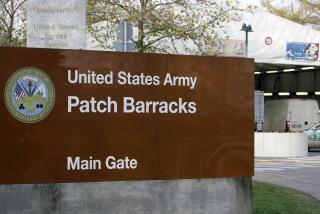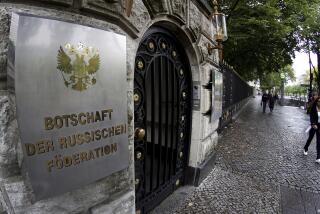6 More Marines Recalled as Security Probe Widens
- Share via
WASHINGTON — Six Marine guards, including one who sources said served last year in Moscow, have been removed from their embassy posts on two continents as the investigation of security breaches has expanded from the Soviet capital to a score of U.S. diplomatic missions worldwide, Pentagon officials said Tuesday.
At least 50 present or past embassy guards in 20 countries have been questioned by military investigators in the aftermath of the sex-and-spy scandal involving Marines in the Soviet capital, according to sources close to the inquiry.
The former Moscow embassy guard, who served last year with two Marines now accused of espionage, was detained at his new assignment in Brazil, sources said, and is being returned to the United States for further questioning. The nature of the allegations against him was not disclosed.
In addition, four Marines who had served at U.S. embassies in the Soviet-bloc countries of Czechoslovakia, Hungary and Bulgaria are being returned from the U.S. Embassy in Vienna, their current assignment, on suspicion of violating rules against fraternizing with citizens of communist countries, Robert Sims, the chief Pentagon spokesman, said.
Sims said the sixth Marine guard recalled, who is also in Vienna, is being investigated for violations of “local security regulations.”
Recall of the six guards is the latest in a series of shake-ups at U.S. embassies since former Moscow guards Sgt. Clayton J. Lonetree and Cpl. Arnold Bracy were charged with espionage for allegedly giving KGB agents access to secret sections of the Moscow embassy. Officials have since ordered all 28 Marine guards in Moscow replaced, as well as all six sentries at the U.S. consulate in Leningrad.
The sources who disclosed the questioning of the 50 Marines in 20 countries said that some are expected to be witnesses in the proceedings against Lonetree and Bracy.
A third Marine guard, Sgt. John J. Weirick, has been arrested on suspicion of committing espionage while assigned to the Leningrad consulate.
Sims, responding to questions at a Pentagon briefing, said the investigation that led to espionage charges against Lonetree and Bracy now has expanded worldwide. “A number of people are being questioned at our embassies and at locations around the world,” he said.
Lie Tests Considered
He said also that the Marine Corps has tightened procedures for selection of embassy guards and was considering more changes, including possible random use of lie-detector tests, a step recommended by an internal Pentagon study.
The Pentagon spokesman refused to identify the five Marines removed from the Vienna embassy security detachment.
“None of these are under arrest, nor have they been charged,” he said. “All are being returned for questioning.”
A sixth Marine guard in Vienna, also unidentified, has been returned to the United States to testify today at a military judicial proceeding for Lonetree, Sims said. He described the session as the equivalent of a civilian grand jury proceeding and said it would be closed to the public and media.
Lonetree’s attorneys said Monday that they have prepared motions seeking to move the case to a civilian court on grounds that a fair trial in military courts “is an absolute impossibility.”
At the time of his arrest in December, Lonetree was serving as an embassy guard in Vienna, a post to which he had been transferred after serving for more than a year at the U.S. Embassy in Moscow.
Embassy Security Doubted
Defense Secretary Caspar W. Weinberger said Tuesday that U.S. officials do not consider the embassy “a secure building any more.” In an interview on ABC-TV’s “Good Morning America,” Weinberger said the doubts about security result from the fact that “the Soviets and the KGB had that long in the building to plant all of their equipment.”
Weinberger said also that the military’s review of the training and selection procedures for embassy guards includes whether “we can assign more married Marines to these tasks.”
All Marine embassy guards now are required to remain single while assigned overseas, in part to avoid the cost of housing families.
More to Read
Sign up for Essential California
The most important California stories and recommendations in your inbox every morning.
You may occasionally receive promotional content from the Los Angeles Times.













